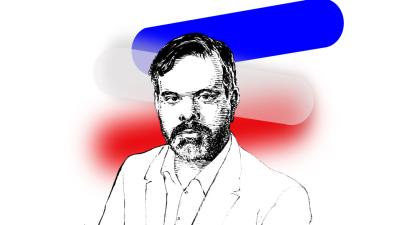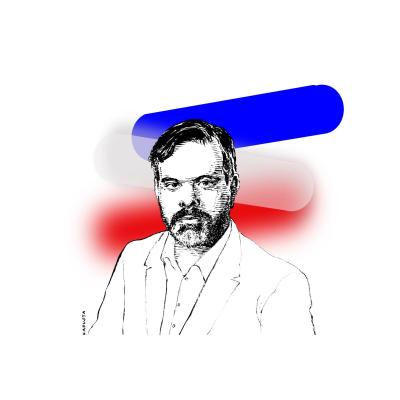France: a chimerical rule of law that undermines the credibility of the State and delegitimizes the law
Once again, a professor - Dominique Bernard - has been murdered. Once again, the perpetrator had no business to be in France and should have been deported long ago. Once again, politicians have paid heartfelt tributes. Once again, they promised to be even more inflexible. Once again, they lied.
The family of the killer (born in Russia) left their homeland to settle in France so that they could follow their Salafi creed in complete freedom. As Salafism is a rigorist and backward practice of Islam, this alone should have rung alarm bells. The family arrived in France in 2008 and applied for asylum, but their application was rejected the same year, so they appealed. During this appeal, they were allowed to stay in France. Two years later, in 2010, their appeal was rejected. Despite this, they were again allowed to stay in France because they asked for their situation to be re-examined, with a new file containing a “new element” for the new asylum application. Yet their application was rejected again. The family received an OQTF (Obligation de quitter le territoire français). However, by appealing against this administrative measure in 2011, they remained in France while their appeal was being examined. That appeal was rejected too, so the family appealed against this decision. That appeal was also rejected in 2013. They were able to remain in France by using a new legal route to delay their departure. Finally, in 2014, on the very day the family was due to be deported to Russia, Emmanuel Valls, the Interior Minister at that time, under pressure from NGOs, ordered Prefect Strodza (now Emmanuel Macron’s chief of staff) to ignore all the previous legal and administrative decisions and halt the deportation on the grounds that the family had children who had been at school in France for more than 5 years. And don’t think that this story is exceptional: in France, on average, only 12% of OQTFs are carried out, compared with 43% for the European Union as a whole, 60% for Germany and 74% for Poland.
So not only has this family’s abuse of the law been rewarded at the political level, since they have managed to stay in France for 6 years by abusing French law, but – what is more - if the Home Secretary’s office hadn’t intervened, the professor would still be alive. And this is not all, because the family’s legal assistance in making all their applications and appeals was paid for with French taxpayers’ money. This family has lived and been able to stay in France thanks to social benefits paid for by the French. The NGOs that helped them with the procedures and prevented their expulsion were also paid for with French money. The schooling of the family’s children was paid for with French money. The judges and civil servants who did everything to ensure that this family wasn’t deported were paid for by the French. The Minister of the Interior and his cabinet, who cancelled 6 years of legal and administrative procedures in a matter of hours, were paid by the French.
Do all these politicians and associations, who finally have blood on their hands and have used public money to defend a family of dangerous Islamists (the father and brothers are known to the police for their various acts of violence and Islamism), risk the slightest sanction? Sadly, no. Worse still, they do not even think of apologizing. Emmanuel Valls, who throughout his political life has played the matador, going from attack to attack, from rodomontade to rodomontade, has brushed it all aside with a wave of his hand: “This family met the criteria of the circular on undocumented migrants”, a circular of which he is the author. That was in 2014 and nothing has changed since then. As Mickaelle Paty, the sister of Samuel Paty (the other teacher whose throat was slit in 2020), told the Senate: “Did my brother’s death serve any purpose? If it had, perhaps Dominique Bernard would still be here.
If you’ve learned your lesson well, you’ll reply in chorus that this is the “rule of law”. Over the last twenty years or so, the rule of law has become a recurrent theme among our politicians and influencers. It is used as a kind of totem, a magic phrase when we want to explain the powerlessness of the state to solve a problem or cast aspersions on any opposition. Worse still, while 95% of the population would be incapable of correctly defining the notion of the rule of law, it has become the supreme ideal, even though it is merely the expression of the principle of legality, as opposed to the state of affairs or the police state. The rule of law is simply a hierarchy of norms (the law must comply with the constitution, regulations within the law, etc.) which is applicable to everyone, without exception, in the same way. Above all, we should not forget that in a democracy, the highest standard is the will of the people; otherwise the USSR or the Islamic Republic of Iran could be said to observe the rule of law.
But where is the law when a family of dangerous Islamists, illegal migrants, abuses it to stay in France and commit their crimes? Where is the law when politicians ignore all legal and administrative decisions to keep this family of illegal migrants in France? Where is the State when it allocates the taxes of its citizens, whom it is obliged to protect, to defend foreigners who wish them harm? The first right of a citizen in a democracy is to be protected by the State. Where is the general interest, the supreme goal of any State, in preferring to risk the lives of its citizens rather than send home people who openly hate them? Emmanuel Macron was more honest in openly admitting the powerlessness of public authorities: “In a state governed by the rule of law, it will never be possible to have a system in which the risk of terrorism is totally eradicated”. By trying too hard to make the rule of law a supreme ideal, we are undermining the credibility of the State and delegitimizing the law itself.
Read also
It is time for Paris to stop believing the Russian anti-Polish narrative and clean up its act
Since Russia's invasion of Ukraine and the solidarity shown by Poles towards Ukrainians, negative articles against Warsaw in the French press have considerably decreased.
Patrick Edery
Europe's Southern Flank Under Russian Attack
We underestimate the determination of the KGBists in power in Moscow to take revenge on the West so much that we refuse to see their attack on our southern flank.
Patrick Edery
France: Jews in danger
Since the Hamas pogrom in Israel on 7 October, the number of anti-Semitic acts in France has soared to 1,518, according to the French Minister of the Interior.








Comments (0)